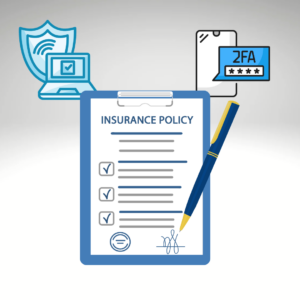- For Enquiry
- 847-868-9253
- 847-868-9208

Common Mobile Malware Traps
September 27, 2024
Cybersecurity Awareness Month: Empowering a Secure Digital Future
September 27, 2024In the digital era, cyber insurance has become a critical component of business risk management. As cyber threats evolve, so do the requirements for cyber insurance coverage. This blog explores these changing requirements and why measures like multi-factor authentication (MFA) and endpoint protection are becoming increasingly important.
requirements for cyber insurance coverage. This blog explores these changing requirements and why measures like multi-factor authentication (MFA) and endpoint protection are becoming increasingly important.
What is Cyber Insurance?
Cyber insurance is a type of insurance designed to protect businesses from the financial fallout of cyber threats such as data breaches, ransomware attacks, and other forms of cybercrime. It typically covers expenses related to data restoration, legal fees, notification costs, and sometimes, ransom payments.
Evolving Requirements of Cyber Insurance:
- Risk Assessment: Insurers are placing greater emphasis on comprehensive risk assessments before providing coverage. This means evaluating a company’s current cybersecurity practices, incident response plans, and overall security posture.
- Increased Security Measures: As part of risk mitigation, insurers now often require businesses to implement specific cybersecurity measures, such as MFA and endpoint protection.
Multi-Factor Authentication (MFA):
MFA adds an additional layer of security by requiring users to provide two or more verification factors to gain access to a resource, like a database or an online account. This could include something you know (a password), something you have (a smartphone), or something you are (biometric verification).
Why MFA is Important for Cyber Insurance:
- Reduces Risk of Unauthorized Access: MFA significantly decreases the chances of a successful cyber attack by making it harder for attackers to gain access, even if they have a password.
- Insurance Requirements: Many insurers now consider the presence of MFA as a critical factor in determining eligibility and pricing for cyber insurance policies.
Endpoint Protection:
Endpoints are devices like computers, mobile phones, and servers that connect to a company’s network. Endpoint protection involves securing these devices from malicious activities and threats.
Significance of Endpoint Protection in Cyber Insurance:
- Comprehensive Security: It ensures that all devices connected to a network are secure, reducing the risk of data breaches and malware attacks.
- Insurance Compliance: Demonstrating robust endpoint protection can be a key factor in securing favorable cyber insurance terms.
The Future of Cyber Insurance:
As cyber threats continue to evolve, so will the requirements for cyber insurance. Businesses can expect insurers to demand more sophisticated cybersecurity measures and a proven track record of effective cyber risk management.
Cyber Insurance Application Process:
- Assessment of Cybersecurity Practices: Businesses must provide detailed information about their cybersecurity practices, including the use of MFA and endpoint protection.
- Premium Calculation: Insurers use this information to assess risk and calculate premiums. Better cybersecurity practices generally lead to lower premiums.
Cyber insurance is an essential tool in the modern business’s risk management arsenal. Understanding and meeting the evolving requirements not only helps secure a good insurance policy, but also significantly strengthens a business’s overall cybersecurity posture. However, it isn’t an easy process: we are available to help you get started and can walk you through each step!



